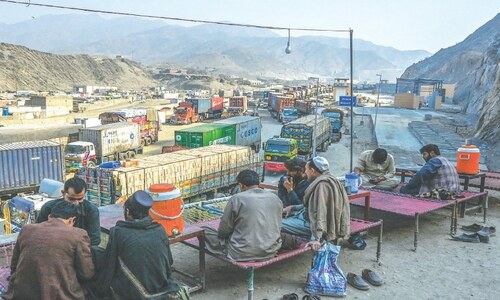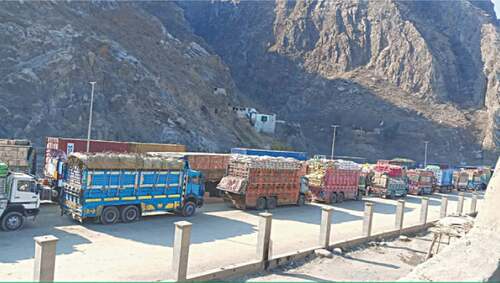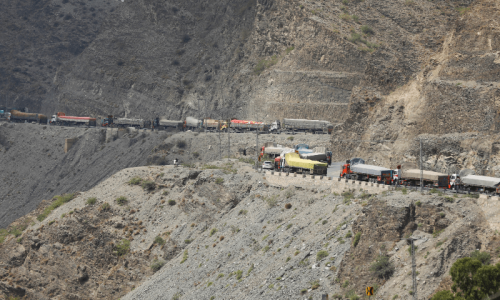THE Torkham border crossing, the busiest trade route between Pakistan and Afghanistan, remains shut for the 10th consecutive day on Monday amid strained relations between the two countries.
The crossing was closed on Jan 13 after Pakistani officials at the crossing began asking for passports and visas from Afghan drivers under a new policy, prompting a reciprocal ban on Pakistani truckers by the Afghan Taliban authorities.
The border closure came in the wake of a Pakistan government decision to start expelling more than a million undocumented foreigners, mostly Afghans, on Nov 1, amid a row over accusations that Kabul harbours militants that launch cross-border attacks.
Pakistan has maintained that the requirement for legal travel documents was implemented the world over, with Pakistan and Afghanistan being no exception.
Frequent, prolonged shutting of Torkham and other crossings may compel Afghan traders to look elsewhere
Islamabad claims that Afghan authorities have been conveyed the message on the imposition of the visa policy several times, but Kabul had failed to take any practical steps to adhere to international border crossing rules. Immigration officials at Torkham say the new policy would help them keep track of all the people frequently travelling on both sides of the border.
Traders say the Torkham deadlock has resulted in significant economic losses for people in both countries, with daily losses estimated at around $100,000. Several rounds of negotiations have failed to produce results.
It is not the first time that Torkham is shut. The border crossing has been closed several times in recent months, including in September when it remained shut for nine days due to clashes between border forces.
Discussions with officials on either side of the border suggest both countries are equally responsible for the frequent closures.
Afghan Taliban officials said Pakistan only spoke about security concerns and did not pay attention to trade, economic and transit issues. They feel Pakistan had not taken similar decisions during the previous government in Afghanistan despite strained ties. This sentiment echoes the views of Pakistan’s former ambassador to Afghanistan, Abrar Hussain, who advocates for a more inclusive approach.
He said Pakistan should chalk out a strategy to encourage Afghans to invest in the country so they should not go to other countries.
“Pakistan should not look towards Afghanistan only through the lens of security. We should welcome Afghan traders, investors, business leaders as it will benefit Pakistan,” Mr Husain told Dawn on Saturday.
He said Afghan traders now prefer to go to other countries instead of Pakistan as “there is a lack of focus on trade and business”. He added, “We must facilitate Afghan traders as it would be a win-win situation for both countries.”
Significant losses
Business leaders from both nations are united in opposing the border closures. Khan Jan Alokozai, the vice president of the Afghan Chamber of Commerce and Industry, said Pakistani and Afghan traders suffer losses of about $100,000 daily due to Torkham’s closure.
He alleged that Pakistan usually closes trade routes due to political reservations. “Afghans have almost stopped transit via Pakistan when Pakistan issued a new SRO (statutory regulatory order) nearly four months ago,” Mr Alokozai told Dawn from Kabul last week.
Pakistan has slapped a 10 per cent duty on Afghan goods imported via Karachi ports and also added dozens of items to the negative list.
“We are currently not importing goods through Pakistan. As far as bilateral trade is concerned, Pakistan and Afghanistan equally need it. Pakistan’s fruit is used in Afghanistan and also goes to Central Asia through Afghanistan,” he pointed out.
In 2010, the two nations revised the Afghanistan-Pakistan Transit Trade Agreement, which calls for greater facilitation in the movement of goods. The 2010 agreement superseded the 1965 transit trade agreement, which granted Afghanistan the right to import duty-free goods through Pakistani seaports, mostly from Karachi.
However, the previous agreement did not offer Pakistan reciprocal rights to export goods to the erstwhile Soviet Union, nor to the Central Asian Republics after the fall of the USSR.
Mr Alokozai noted that Afghanistan’s exports to Pakistan stood at around $1 billion while Pakistan’s exports to its neighbour were $1.3bn.
Ziaul Haq Sardahi, coordinator of the Pak-Afghan Joint Chamber of Commerce and Industry (PAJCCI), said Pakistani exporters have urged the government to give Afghan drivers more time to get passports.
“Traders in both countries suffer millions of rupees of losses due to the closure of the Torkham border,” Mr Sarhadi said, adding that several other crossings to Afghanistan also remain closed, including Chaman in Balochistan, Ghulam Khan Kelay in North Waziristan, Angoor Adda in South Waziristan, and Kharlachi in Kurram district.
Some 2,000 to 2,500 trucks on each side of the border remain stranded, he said, adding that the disruption has also affected Pakistan’s trade with Central Asia.
‘Bypassing Afghanistan not easy’
Abdul Salam Jawad, spokesman for the Afghan commerce ministry, hinted at Afghanistan’s potential pivot towards direct trade with China through the Wakhan Corridor, further diversifying its trade routes.
Work on a road up to the Chinese border was already underway and would be completed soon, Mr Jawad told Dawn from Kabul.
This ongoing scenario not only affects the historic Afghanistan-Pakistan Transit Trade Agreement but also has broader implications for Pakistan’s regional trade dynamics, particularly with Central Asia, as observers say that the country will find it difficult to bypass Afghanistan and find alternative trade routes with the Central Asian states.
Besides, the frequent and prolonged closure of trade routes will compel Afghan traders to divert to other avenues, such as Chabahar Port.
The abrupt closure of the Torkham crossing has also further strengthened the perception among the Afghan Taliban rulers that Pakistan had taken a hard line this time and was taking measures it had not done during the governments of Ashraf Ghani and Hamid Karzai.
The Afghan Taliban rulers should also think that they are no longer a militant and fighting group but ruling a country. They must understand the sensitivity of other countries, especially neighbours. The Afghan Taliban leadership must also rein in those elements who are bent on destroying relations with Pakistan.
Published in Dawn, January 22nd, 2024












































